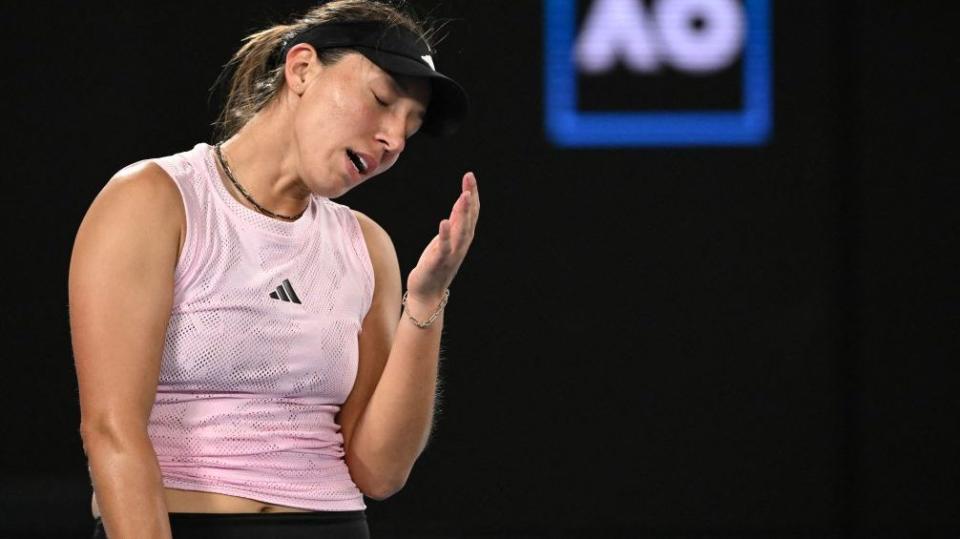
MELBOURNE, Australia — Victoria Azarenka displayed the same confident brand of hard-hitting baseline tennis that carried her to two Australian Open titles and the No. 1 ranking a decade ago, beating Jessica Pegula 6-4, 6-1 on Tuesday night to return to the semifinals at Melbourne Park.
Azarenka won the 2012 and 2013 championships in Australia, but she had not been back to the final four there since then.
Now 33 and a mother — she walked out into Rod Laver Arena wearing a jersey from her 7-year-old son’s favorite soccer team, Paris Saint-Germain — Azarenka, who is from Belarus, delivered big shot after big shot, raced to a 3-0 lead in 12 minutes, and never really let the No. 3-seeded Pegula, a good friend, get into the match.
“Leo doesn’t really care so much that I’m playing here,” Azarenka said with a laugh. “He worries more about his football and when are we going to go play again. Obviously, he is watching some matches, but he definitely wants his mom to be home. So a few more days here, and I’ll be back.”
Might make the trip with a trophy in tow if she keeps playing like this.
Even when Pegula did grab a game, she needed to work so hard for it, erasing six break points before finally holding serve to get on the board. It was a far cry from the sort of success Pegula had earlier in the tournament: She entered Tuesday having dropped zero sets and 18 games across four previous matches.
AUSTRALIAN OPEN DRAWS: Women | Men
The No. 24-seeded Azarenka’s semifinal opponent will be No. 22 Elena Rybakina, the reigning Wimbledon champion, who defeated 2017 French Open champion Jelena Ostapenko 6-2, 6-4 on Tuesday afternoon. That match was delayed for about 20 minutes in the first set while the main stadium’s retractable roof was shut because of rain.
Rybakina hit 11 aces to take her tournament-leading total to 35.
“I got all the experience at Wimbledon, and it’s helping me now this time, here in Australia, and I know what to expect,” said Rybakina, who was born in Moscow but has represented Kazakhstan since 2018 because it offered to fund her tennis career. “For sure, it’s just easier in this case.”
In men’s action, Karen Khachanov reached his first semifinal at Melbourne Park — and made his second consecutive trip to the final four at a Grand Slam tournament, following his run at the U.S. Open last September — when 22-year-old American Sebastian Korda stopped playing in the third set because of an injured right wrist.
Khachanov will face either No. 3 Stefanos Tsitsipas of Greece or unseeded Jiri Lehecka of the Czech Republic for a berth in the men’s final. Tsitsipas and Lehecka were scheduled to play their quarterfinal Tuesday night.
Korda, whose father Petr was the 1998 champion in Australia, felt pain in his wrist when he mis-hit a forehand service return in the second set. He called for a trainer to examine and tape it. But Korda retired from the match while trailing 7-6 (5), 6-3, 3-0.
Soon, Khachanov was doing an on-court winner’s interview, telling the spectators to offer applause for his injured opponent, while Korda was walking toward the locker room, a red equipment bag over his left shoulder and a dour look on his face.
“I kind of reinvented myself, I would say. I always believed in myself, but there are always ups and downs,” said Khachanov, a 26-year-old Russian who is seeded No. 8. “And sometimes when you have this great result, it just shows you what you are capable of and you start to believe more and more.”
Korda’s wrist first bothered him during a tune-up tournament in Adelaide earlier this month, but he said it seemed to be fine over the past two weeks until Tuesday.
“I kind of felt that spot that I was feeling before,” Korda said. “Some forehands, I couldn’t even hold the racket. Volleying was almost impossible for me. So it was a little tough.”
A three-time runner-up at the U.S. Open, most recently in 2020, Azarenka has always played most effectively on hard courts, and that showed again on this evening. She repeatedly got the better of lengthy exchanges of forehands and backhands; Pegula made eight of the match’s first 10 unforced errors.
After some misses, Pegula would sigh, roll her eyes, slump her shoulders. She often looked into the stands at her coach, Davis Witt, to say something, including one exclamation about the ball speed of “It’s so … slow!”
“It hurts to beat her, because I always want her to do well. But also, at the same time, I know I have to play my best tennis. … I knew from the first point I have to bring it,” Azarenka said. “We had so many rallies, and I just wanted to try to stay there, take opportunities, because she was going to take everything if I don’t try to win it myself.”
Pegula, a 28-year-old from New York, was playing in the quarterfinals in Melbourne for the third year in a row but fell to 0-5 for her career at that stage in Grand Slam tournaments. Her parents own the NFL’s Buffalo Bills, and Pegula wore a patch on her skirt during matches with the No. 3, the jersey number of player Damar Hamlin, who collapsed on the field during a game on Jan. 2.
Her exit Tuesday leaves No. 5 Aryna Sabalenka as the lone top-20 woman still in the bracket. On Wednesday, Sabalenka will play unseeded Donna Vekic in the quarterfinals, while No. 30 Karolina Pliskova faces unseeded Magda Linette.
OlympicTalk is on Apple News. Favorite us!
More: Olympics
Alix Klineman, beach volleyball gold medalist, is pregnant, may make 2024… Ester Ledecka to miss Alpine skiing world championships With war at home in Ukraine, Anastasiia Smirnova and Danil Siianytsia persevere…
Jessica Pegula, Sebastian Korda knocked out in Australian Open quarterfinals originally appeared on NBCSports.com
